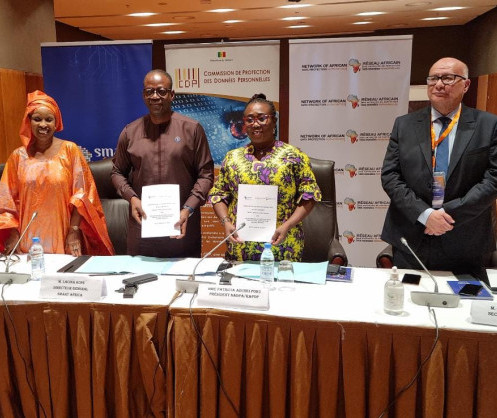
Dakar, Thursday, March 10th, 2022 – The Smart Africa Alliance (SA) has signed an MOU today with NADPA/RAPDP (Network of African Data Protecion Authorities) to provide institutional support and enhance the enforcement capacities of the African National Authorities. Originally started during the first discussions between Smart Africa and NADPA/RAPDP held in Benguerir, Morocco, on November 26th 2021, the need to join forces has successfully led to the signature of the Memorandum of Understanding (“MOU”) which is entering into force in Dakar, Senegal effective as of March 10th, 2022.
This MOU is laying the ground of a genuine pan African dialogue and cooperation. NADPA/RAPDP and SA are coming together to:
- support national data strategies and enforcement of data protection regulations in order to create a harmonized framework for data protection policies and regulation in Africa;
- support African States in preparing or updating legislation on the protection of privacy and personal data, and in establishing data protection authorities;
- develop and conduct joint capacity building modules for African Data Protection Authorities (DPAs) through Smart Africa Digital Academy (SADA) whenever possible;
- develop in place initiatives for enhanced legal collaboration between African Data Protection Authorities to support the digitalization of the continent.
Patricia Poku, Executive Director of the National Data Protection Commission of Ghana and President of NADPA/RAPDP declared: “Our organization has reached a new milestone and is now ready to enter into such an ambitious partnership. We are very much excited and looking forward to achieve all our commitments not only from a data governance and data protection legal harmonization point of view but also for the development of a regional training and certification for African data protection professionals, in order to address the skills deficit in this field.”
Commenting on this strategic MOU signature, the CEO of Smart Africa, Lacina Koné said: “I am very pleased that both Smart Africa and NADPA/RAPDP have come together through this MOU signature. We need to work on our enforcement capacities for our data protection policies and intensify our panafrican collaboration. If not, our laws will remain empty shells. In line with Malabo Convention, but also the new Continental Data Policy Framework of the African Union Commission, this MOU will help facilitate and accelerate harmonization and legal collaboration between our countries members state. For Awa Ndiaye, President of the CDP Senegal, “The MOU represents a strategic framework for design and sharing between key players in the protection of personal data. It is in line with initiatives to make Africa a safe and enabling space for digital transformation.”
About Smart Africa:
Smart Africa is an alliance of 32 African countries, international organisations and global private sector players tasked with Africa’s digital agenda. The alliance is empowered by a bold and innovative commitment by African Heads of State to accelerate sustainable socio-economic development on the continent and usher Africa into the knowledge economy through affordable access to broadband and the use of ICTs.
With a vision to create a single digital market in Africa by 2030, the Smart Africa Alliance brings together Heads of State who seek to accelerate the digitalization of the continent and create a common market. Launched in 2013 by seven (7) African Heads of State, the Alliance now has 32 member countries, representing over 815 million people and over 40 Private Sector members committed to the vision and the advancement of Africa.
About the NADPA/RAPDP:
The NADPA/RAPDP (Network of African Data Protection Authorities/Réseau Africain des Autorités de Protection des Données Personnelles) brings together African national authorities whose mission is to promote the protection of personal data and privacy as a fundamental human right. The network was created in Ouagadougou in September 2016 during the 2nd African Forum of Personal Data Protection Authorities. As of August 2021, the network includes nineteen member authorities and two authorities with the observer status.
The organs of the Network are the General Assembly and the Bureau, which is supported by the Permanent Secretariat.
